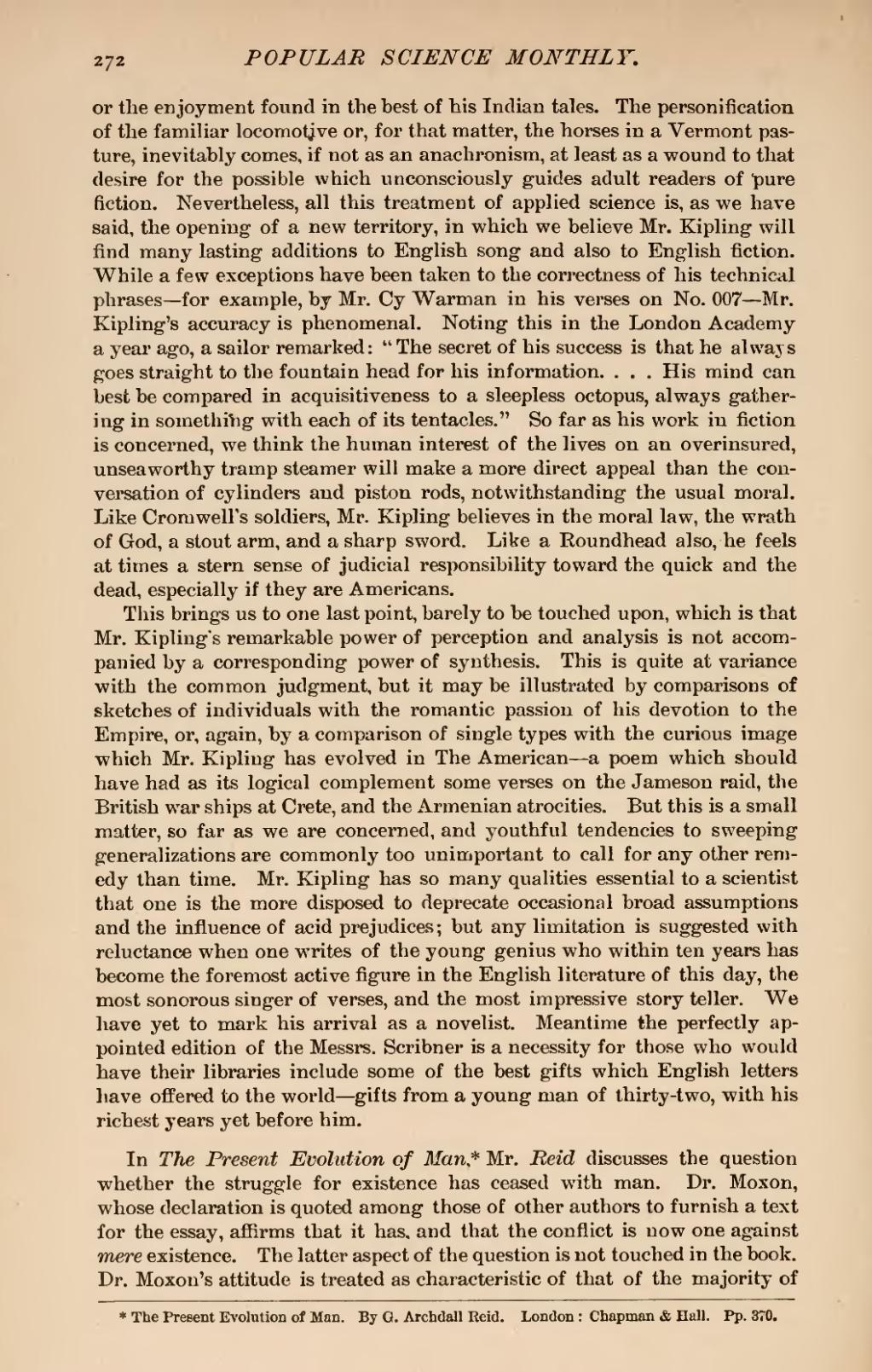or the enjoyment found in the best of his Indian tales. The personification of the familiar locomotive or, for that matter, the horses in a Vermont pasture, inevitably comes, if not as an anachronism, at least as a wound to that desire for the possible which unconsciously guides adult readers of pure fiction. Nevertheless, all this treatment of applied science is, as we have said, the opening of a new territory, in which we believe Mr. Kipling will find many lasting additions to English song and also to English fiction. While a few exceptions have been taken to the correctness of his technical phrases—for example, by Mr. Cy Warman in his verses on No. 007—Mr. Kipling's accuracy is phenomenal. Noting this in the London Academy a year ago, a sailor remarked: "The secret of his success is that he always goes straight to the fountain head for his information. . . . His mind can best be compared in acquisitiveness to a sleepless octopus, always gathering in something with each of its tentacles." So far as his work in fiction is concerned, we think the human interest of the lives on an overinsured, unseaworthy tramp steamer will make a more direct appeal than the conversation of cylinders and piston rods, notwithstanding the usual moral. Like Cromwell's soldiers, Mr. Kipling believes in the moral law, the wrath of God, a stout arm, and a sharp sword. Like a Roundhead also, he feels at times a stern sense of judicial responsibility toward the quick and the dead, especially if they are Americans.
This brings us to one last point, barely to be touched upon, which is that Mr. Kipling's remarkable power of perception and analysis is not accompanied by a corresponding power of synthesis. This is quite at variance with the common judgment, but it may be illustrated by comparisons of sketches of individuals with the romantic passion of his devotion to the Empire, or, again, by a comparison of single types with the curious image which Mr. Kipling has evolved in The American—a poem which should have had as its logical complement some verses on the Jameson raid, the British war ships at Crete, and the Armenian atrocities. But this is a small matter, so far as we are concerned, and youthful tendencies to sweeping generalizations are commonly too unimportant to call for any other remedy than time. Mr. Kipling has so many qualities essential to a scientist that one is the more disposed to deprecate occasional broad assumptions and the influence of acid prejudices; but any limitation is suggested with reluctance when one writes of the young genius who within ten years has become the foremost active figure in the English literature of this day, the most sonorous singer of verses, and the most impressive story teller. We have yet to mark his arrival as a novelist. Meantime the perfectly appointed edition of the Messrs. Scribner is a necessity for those who would have their libraries include some of the best gifts which English letters have offered to the world—gifts from a young man of thirty-two, with his richest years yet before him.
In The Present Evolution of Man[1] Mr. Reid discusses the question whether the struggle for existence has ceased with man. Dr. Moxon, whose declaration is quoted among those of other authors to furnish a text for the essay, affirms that it has, and that the conflict is now one against mere existence. The latter aspect of the question is not touched in the book. Dr. Moxon's attitude is treated as characteristic of that of the majority of
- ↑ The Present Evolution of Man. By G. Archdall Reid. London:Chapman & Hall. Pp, 370.
